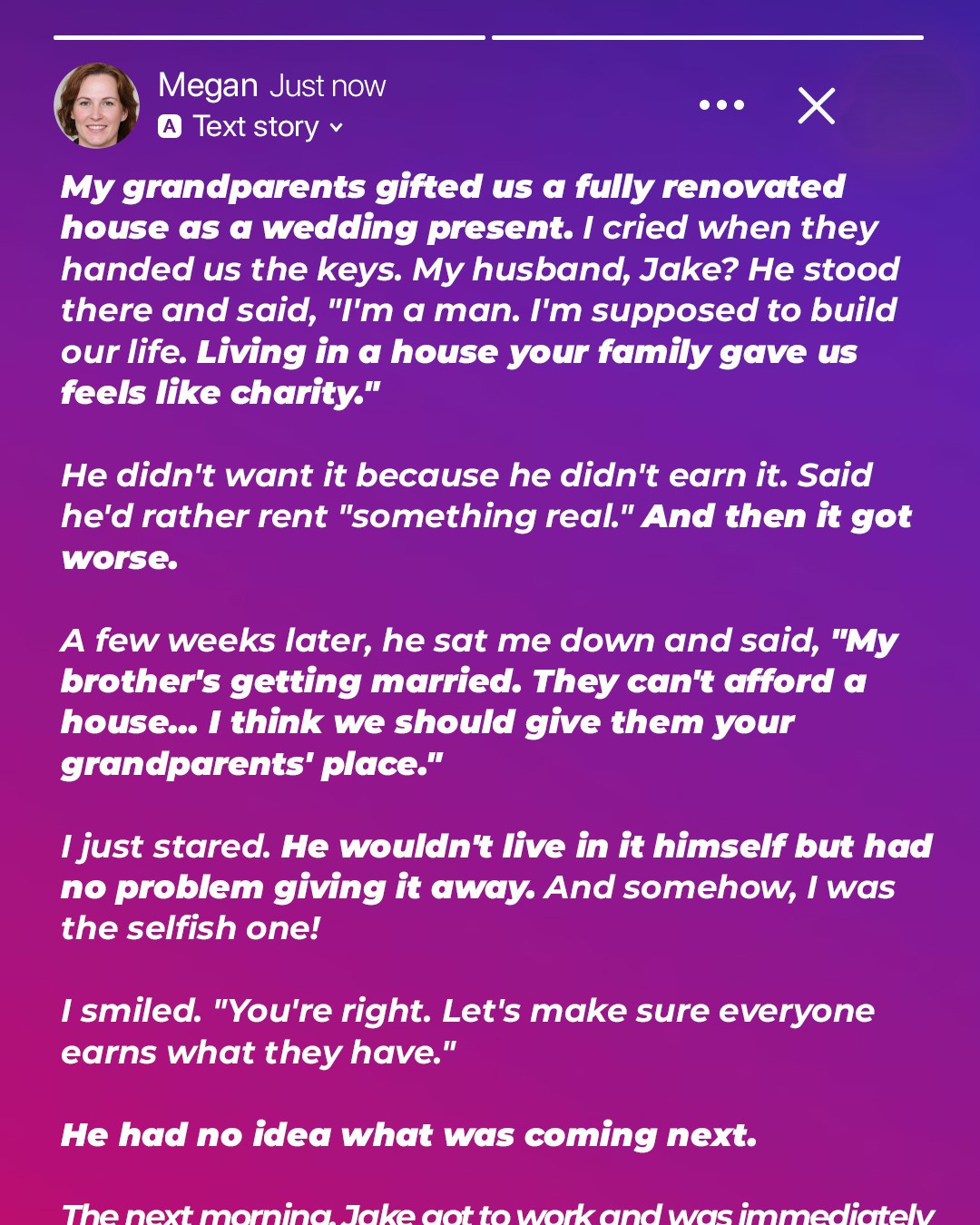My Husband Refused to Live In the House My Grandparents Gifted Us, Then Demanded We Give It to His Brother

When my grandparents surprised us with the keys to their fully renovated Craftsman home—a gorgeous gift complete with real wood floors, a clawfoot tub, and a wraparound porch—I was overjoyed. I envisioned my husband, Jake, shedding tears of gratitude, knowing that our future was set. Our modest two-bedroom apartment had never been fancy, but it was ours, and we were diligently saving for a house by cutting back on extras. I managed the spreadsheets while Jake grumbled each week that renting was a waste and that we should be building equity instead.
But when the gift arrived—no strings attached, just pure generosity from my Nana and Papa—I quickly learned that Jake saw it all very differently. While I celebrated the incredible gesture, he stood rigid, staring at the new house as if it were a symbol of his own inadequacy. I assumed he might have been concerned about where my grandparents would live, but they had already moved to a retirement village. Instead, Jake confided in a quiet tone that the gift felt emasculating. “It’s not mine,” he muttered, “I didn’t earn it. I’m supposed to provide and build our life—not be handed someone else’s success. Living in a house gifted by my family feels like charity.”
I tried to give him space, hoping the shock would wear off, but his resentment only deepened. One day while I was meal-prepping, he dropped a bombshell: “My brother’s getting married, and they’re barely making it. I think we should give them your grandparents’ house.” I nearly dropped the knife I was using. “You’re serious? You want to gift it to your brother?” I demanded, incredulous. Jake argued that his brother needed a fresh start and that, since we weren’t using the house, it would be selfish to let it sit empty while other family members struggled. His logic was twisted—he didn’t want to live there himself because his pride wouldn’t allow it, yet he was willing to hand it over as if it were disposable.
For weeks, we continued living in our overpriced rental, throwing away $1,800 a month while our magnificent future home sat empty. I kept quiet about the real reason behind our financial struggles, pretending it was just a matter of settling finances. But then, one day in the kitchen, Jake, with his usual air of false nobility, announced his plan again. His tone was serious, almost noble, as he declared that his brother deserved the house because he wanted to build a life from scratch. The hypocrisy stung—I was protecting what my grandparents had painstakingly built for generations, while he dismissed it as a handout.
That evening, I called my parents and laid everything out: the gifted house, Jake’s refusal to accept it, his hurtful words, and his new demand to pass it on to his brother. My mother didn’t bat an eye. In fact, she reminded me that Jake had always boasted about earning his way up on his own. What he never mentioned was that my parents had played an enormous part in helping him secure his job—polishing his résumé, conducting mock interviews, and even vouching for him in front of the board.
The next morning, Jake was called into HR and, much to his dismay, let go with a tidy severance package. Later that day, while he was still at work, I received an email from my parents detailing our wedding expenses—line by line, from the venue to the vegan cupcakes he’d insisted on. The message was clear: since Jake believed in earning everything on his own, they would respect his values by holding him accountable.
When Jake returned home, he was pale, his hands trembling as he opened the fridge only to slam it shut moments later. “They fired me,” he whispered, struggling to explain. I simply shrugged and said, “You didn’t want the house, you didn’t want our help—you wanted to prove you could do it all on your own. Now you can.” He crumpled onto the couch, tearfully insisting he was trying to be a man. “No,” I replied firmly, “being a man means accepting help and recognizing that family isn’t a transaction. I’m taking the house out of our name—my grandparents will keep the deed.” His shock was palpable, and as he begged for another chance, I offered one condition: he would have to start from the bottom, with no special treatment. He nodded, and although the pain was evident, I could tell he understood.
For a while, I moved into the house on my own. My grandparents were delighted, and I told them I wanted to tend to the garden—a small haven where I could finally feel at home, free from the poison of pride. Over time, Jake began to visit, helping with simple tasks like pruning the roses or fixing a squeaky gate, offering quiet apologies along the way. He even started saying “thank you”—not just to me, but to the delivery man, the barista, everyone who played a part in our daily lives.
I still don’t know what the future holds, but one thing is clear: pride is expensive, and humility is the real foundation of a home.